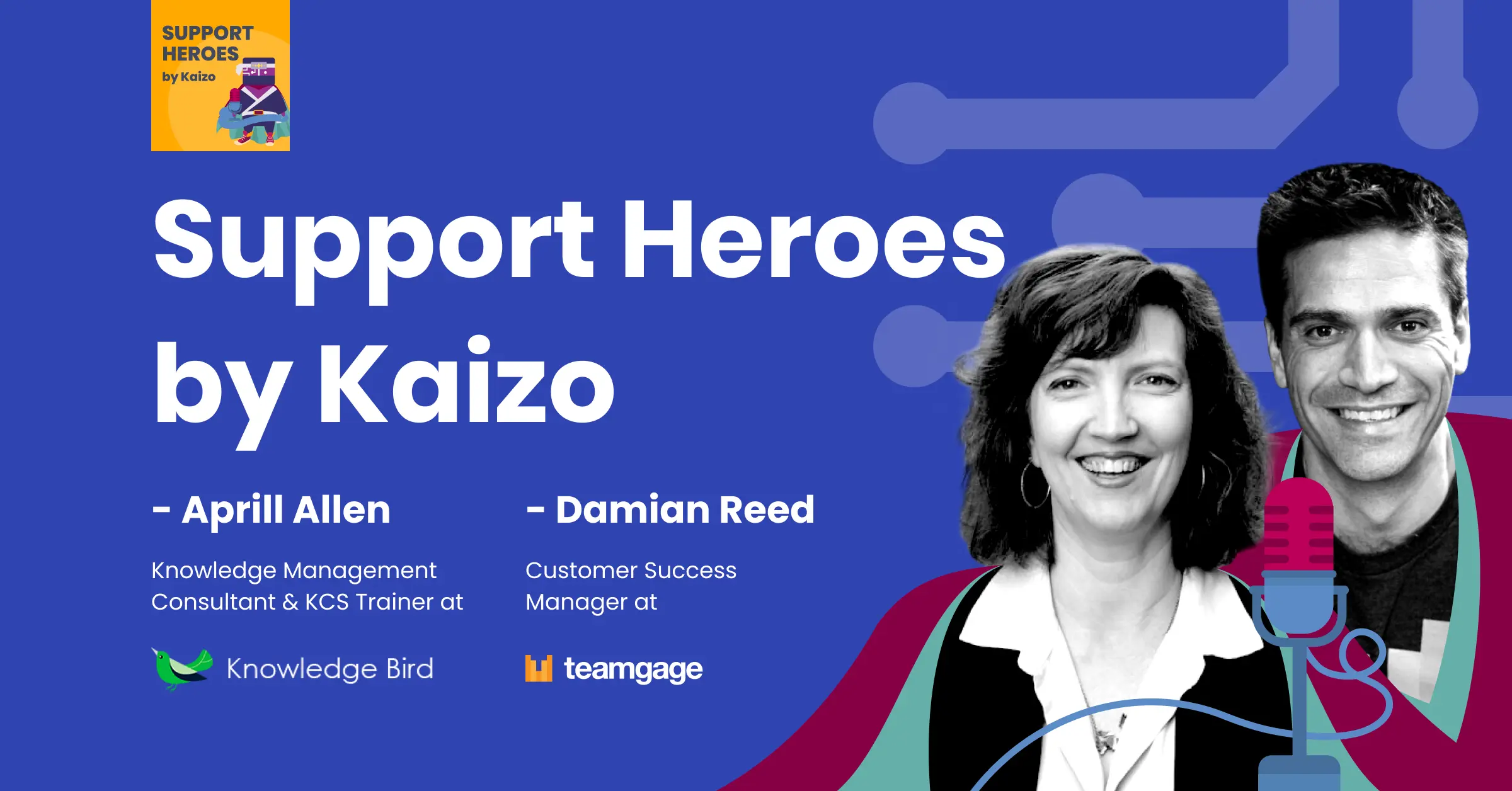Click ‘subscribe’ in the bottom right of the player to listen or download from Apple Podcast, Spotify, Google Podcast, and Amazon Music.
The seventeenth release of Support Heroes by Kaizo featured Aprill Allen- Knowledge Management Consultant at Knowledge Bird & General Partner of Tractor Ventures, and Damian Reed- Customer Success & Support Manager at Teamgage.
In this episode, Aprill Allen and Damian Reed share their experience building and applying knowledge management in support. Both having experience in enterprise organisations as well as startups, the Aussie duo compare and contrast knowledge management in small and large organisations, and share lessons learned from both perspectives. Tune in for actionable advice to benefit employee engagement, customer satisfaction, ticket volume and more.
Key Highlights
1. Keep it short and sweet, do it now and own it as a team
2. Investments into knowledge garner immediate value in multiple places
Keep it short and sweet, do it now and own it as a team
D: “Just start with something. Don’t wait for it to be perfect…You just need to start thinking about how to build something”
There’s no right or wrong time to start building out a knowledge base in support but the best time to start, is right now.
D: “When we’re writing documents, sometimes we’re too thorough. We’re too detailed. I think you need to take a step back from that- just capture the key points and make it light to start with”
Getting things done as briefly and simply as possible makes articles easy to read but also ready to get done in the moment- when it’s easiest to recall exactly what happened. Aprill calls this “Acting at the speed of conversation”.
This essentially entails capturing what occurred and outlining the solution in a few simple bullet points at the time that the ticket or solution was found.
A: “Then we can publish that to our internal knowledge base so other team members can use it straight away. That’s where you immediately get a return on investing that little bit of time to create a knowledge article”
The reason for keeping it short is not only to allow articles to be drawn up immediately after encountering a ticket but also because those articles have an expiration date…
A: “The nature of support articles are that they’re transient most of the time”
A: “You’re going to get a lot of hits on that article for a period of time and then you won’t need it anymore”
So don’t sweat the small stuff! Invest time into detail relative to how long articles will be useful. Don’t lose time working on something that will be obsolete in a few weeks.
A: “Embracing knowledge as an asset and using it to solve problems is something the team needs to own.”
A: “Instead it being an additional piece of work that we punt down the line… leadership needs to set the expectation that this [knowledge work] has to happen and the reason is that [the knowledge work] enables us to hit our strategic outcomes”
It’s a team effort. Getting it done involves everyone taking responsibility to quickly write up their lessons learned but by doing so, you can have a functional knowledge base in a few days or weeks.
Investments into knowledge garner immediate value in multiple places
A knowledge base can benefit both customers and the department by preventing tickets before they happen. This is otherwise known as proactive support.
D: “If we can answer [customer queries] with a knowledge base without [customers] creating a support ticket through our system, we can do more things with the same amount of resources”
It can benefit employee engagement and prevent churn which is a huge challenge in the support industry.
D: “Having the right tools and the right resources [available] at the right time, is one of the key pillars of great employee engagement”
But the benefits aren’t just felt in support. Making the knowledge housed in support available to other parts of the business benefits everyone and solidifies the department as a value centre.
D: “I’m not writing knowledge for me. I’m writing it for the person who’s going to do my role, for the customer or for a salesperson who needs some information about the product”


